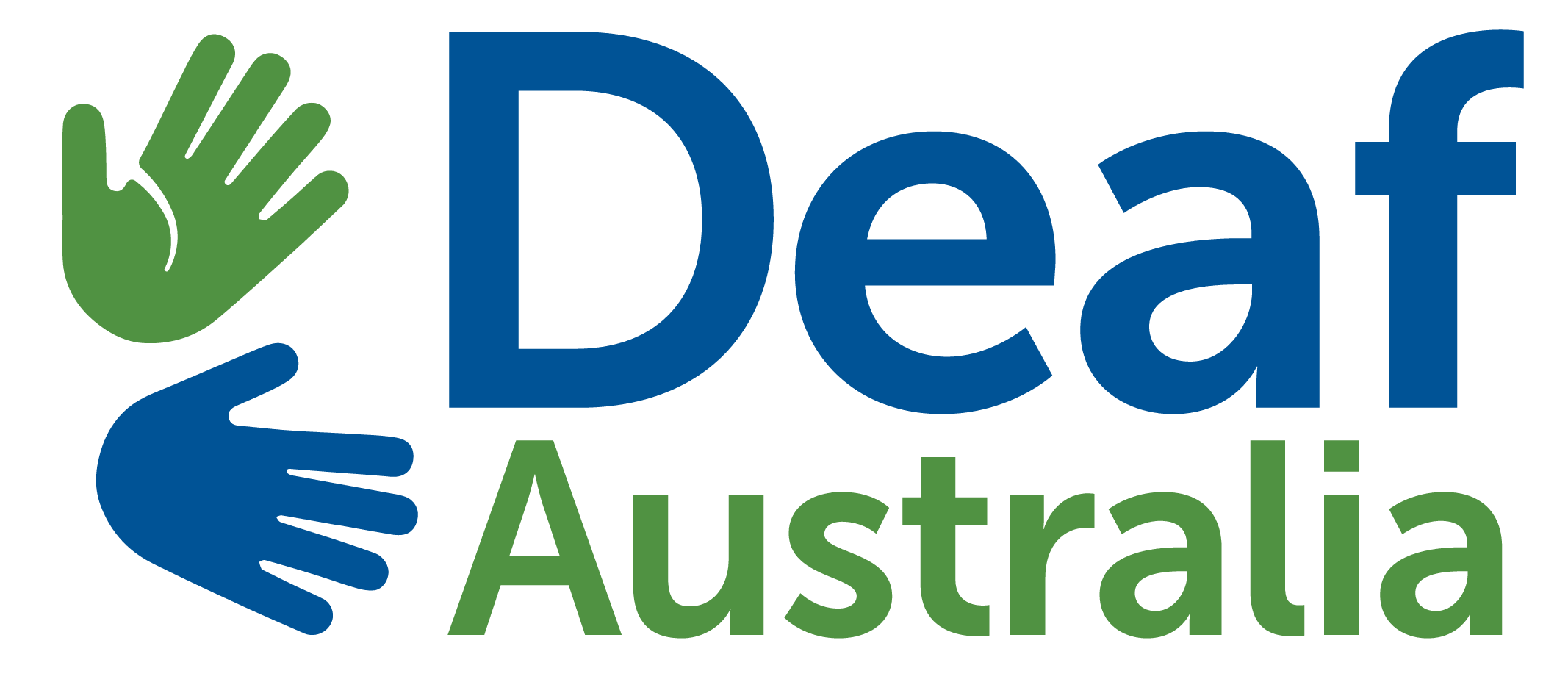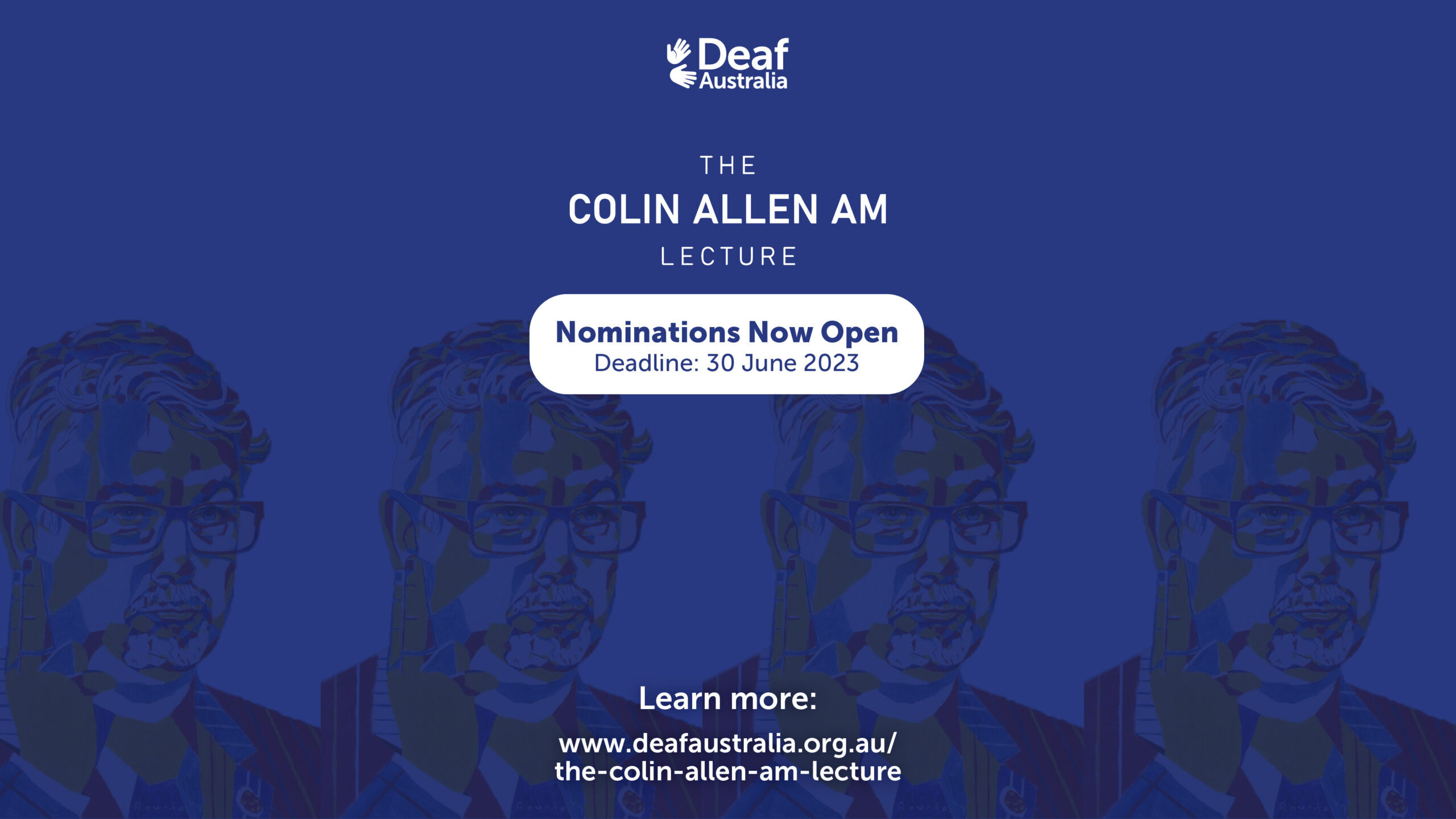No products in the cart.
Category: National Week of Deaf People (NWDP)
NWDP 2018 Events
National Week of Deaf People 2018 Activities and Events
All activities listed here are all registered through Deaf Australia. There may be other activities that is happening around Australia and we do not have this information. Activities may be subjected to change, please regularly check websites for updates.
21 September 6pm – 9pm.
Wine Cheese Night
Ephpheta Centre, 4 Turner Street, Punchbowl, NSW.
RSVP required
Download Flyer here
23 – 29 September – 9am – 5pm (Daily)
‘Healsville Sanctuary Celebrates National Week of Deaf People’
at Healsville Santuary, Badger Creek Road, Badger Creek, Victoria 3777.
Auslan interpreter will be onsite at Healesville Santucary between 11am and 3pm each day.
Website Link
23 September (5 events)
Deaf Market (10am – 3pm)
Front Oval, Deaf Children Australia
597 St Kilda Road, Melbourne Victoria
Download Flyer here
Adelaide Celebration (10am – 12 noon)
University of South Australia
Jeffery Smart Building, Level 1, Hindley Street, Adelaide, South Australia
For catering purpose, please RSVP
Download Flyer here
Deaf Community BBQ (11am – 4pm)
South Australian Museum Front Lawns
North Terrace, Adelaide, South Australia
Download Flyer here
Auslan Guided Tours (11.30am, 1.30pm and 2.30pm)
South Australian Museum
North Terrace, Adelaide, South Australia
Tours have limited spaces available per sessions, register for a tour when arrive.
Download Flyer here
Family Picnic Day (10 am – 3pm)
Jo Whearley All Abilities Play Space
Esplande, Dalkeith, Western Australia
Free admission, BYO – BBQ
Download Flyer here
25 September
Professional Evening with Dr Paddy Ladd (6pm – 8pm)
University of Western Australia
Alexander Lecture Theatre
Admission fee applies
Download Flyer here
27 September (2 events)
The Silent Child (Open – Captioned), followed by Deaf Awareness (4.30pm – 6.00pm)
Mirboo North Library
Ridgeway, Mirboo North, Victoria 3871
Free – booking essential
Download Flyer here
Alpha (Open – Captioned) (6pm for 7 pm start)
Hoyts Carousel
1382 Albany Highway, Cannington, Western Australia
Admission fee applies
Download Flyer here
28 September
May the Best Team Win! (6.30pm – 10.30pm)
Tuart Hill Community Centre
164 Cape Street, Tuart Hill, Western Australia
Admission fee applies
Download Flyer here
29 September
Bindi Bindi Dreaming Workshop (10am – 1pm)
Tuart Hill Community Centre
164 Cape Street, Tuart Hill, Western Australia
Admission fee applies
Additional information here
**Media Release** International Day of Sign Language formally adopted by UN and announcement of National Week of Deaf People 2018
Deaf Australia wishes to congratulate the United Nations in adopting the resolution for the International Day of Sign Languages today at the 72nd United Nations General Assembly.
International Day of Sign Languages will be held on 23 September annually.
The World Federation of the Deaf, which Deaf Australia is a National Member, have sought support from Antigua and Barbuda who proposed this resolution. The resolution was co-sponsored by 97 United Nations Members States (including Australia) and adopted by consensus.
Why International Day of Sign Languages?
The aim of International Day of Sign Languages is to raise greater awareness and recognition of sign languages, and that early access to sign language and services in sign language, including quality education, is vital to the growth and development of deaf individual and critical to the achievement of the internationally agreed development goals.
Why 23 September?
This is the date that commemorate the establishment of World Federation of the Deaf in 1951, which has as one of main goals, the preservation of sign languages and deaf culture as pre-requisites to the realisation of the human rights of deaf people.
What is Australia’s Sign Language?
The sign language of Australia is known as Auslan (Australian Sign Language). Auslan has been recognised by the Federal Government as a community language of Australia in 1991.
How can Australia be Involved?
The National Week of Deaf People (NWDP) is hosted by Deaf Australia and provides many organisations, schools and others the opportunity to raise awareness of deaf people and Auslan. Traditionally, we host this event during October, however in recognition of the establishment of the International Day of Sign Languages, the NWDP will be moved to coincide with the International Day of Sign Languages.
When is the next National Week of Deaf People?
National Week of Deaf People will be on 23 – 29 September 2018. In the following years Deaf Australia hopes to align the National Week of Deaf People with the International Week of Deaf hosted by the World Federation of the Deaf, traditionally held during the last week of September.
What activity can be held during the National Week of Deaf People?
State organisations and other community organisations, clubs, schools and others host a wide range of activities through the week including workshops and lessons where people can learn Auslan, other workshops and presentations about deaf people and their community, community festivals, fundraising activities, and many more.
To find out more about these activities, please check for registered activities on Deaf Australia’s website.
If an organisation wishes to provide activities through the week and to promote to the deaf community, you can register the event on Deaf Australia’s website.
Deaf Australia will be working with the government, business and organisations to help promote the National Week of Deaf People and the International Day of Sign Languages.
Please view here to see Auslan Translation of Media Release.
References:
United Nations’ Resolution: A/C.3/72/L.36/Rev.1
World Federation of the Deaf Press Release: Press Release
National Week of Deaf People: www.deafaustralia.org.au/NWDP
NWDP 2016 – With Auslan, I am equal

Deaf Australia launched the National Week of Deaf People (NWDP) at the National Auslan Conference in Melbourne during the recent weekend, and there will be lots of activities organised by various organisations, clubs and individuals throughout the week.
The theme for the Week is: With Auslan, I am Equal.
The theme will be focusing on:
- Birth Rights: deaf children to access and acquire Auslan as their first language;
- Deaf Identity: deaf people are a cultural and linguistic minority who use Auslan as their primary or preferred language;
- Accessibility: deaf people need access to public information and services through Auslan;
- Equal Language: recognising Auslan as a language equal to spoken/ written languages;
- Equal Employment Opportunity: removing the barriers where hearing is a requirement and promoting greater inclusion and opportunities for deaf people to realise their goals;
- Bilingual Education: accepting the need for bilingual education for deaf children (Auslan and English), and for teachers and interpreters to be fully accessible;
- Equal Participation: deaf people to be able to fully participate in the personal, public and political along with everyone else; and
- Lifelong Learning: access to education, training and ongoing professional development is the key to gaining and retaining a job and being able to make a reasonable living.
Last week, the members of Deaf Australia have overwhelmingly endorsed a new Position Statement on the Requirements for Early Intervention for Deaf and Hard of Hearing Children in Australia. You can download it here.
Deaf Australia also launched the ‘Colin Allen Lecture’ which will be an annual award recognising individuals who promotes the right of deaf people in all walks of life, continuing Colin Allen’s legacy in politics, advocacy, community, international development, sports and/ or theatre.
The Australian Curriculum has submitted the National Auslan Curriculum for publication approval, which will include Auslan as one of the language curricula available for K to year 10. The National Auslan curriculum is expected to be in effect from 2017.
Australian Consumers Communication Actions Network (ACCAN) launched their Auslan Translation Standards and Production Guidelines for producing Auslan content videos at the recent National Auslan Conference.
However, our society still does not treat deaf people equally.
On 5 October 2016, the Australian High Court (Lyons v. Queensland) found that in its present interpretation of the Jury Act, the Queensland State did not discriminate against Ms. Lyons by refusing to provide Auslan interpreters to enable her to undertake her civic duty as a juror. The Jury Act needs to be changed.
As summer is quickly approaching, deaf people will need access to emergency announcements. For deaf people, the best way to get information is through Auslan. All emergency announcements need to be made accessible in Auslan nationally.
Significant numbers of deaf children around Australia do not have full access to Auslan in schools. Deaf children need full access to Auslan for their education.
These are some examples of things that need to change in order to realise deaf people’s capacity to be equal.
With Auslan, I am Equal.
National Week of Deaf People 2016 (15 – 23 October 2016)

With Auslan, I am Equal
Each year, starting on 3rd weekend of October, Deaf Australia and the deaf community in Australia celebrate National Week of Deaf People (NWDP).
Deaf Australia will be launching the NWDP at the National Auslan Conference in Melbourne and there will be heaps of activities organised by various organisations, clubs and individual throughout the week. If you wish to register your event/ activities, please register here.
Throughout the week, Deaf Australia will be posting key messages on our Facebook/ Twitter to raise awareness of the NWDP. You can help by re-posting Facebook messages and re-tweeting our messages.
We will be focusing on
- Birth Rights: deaf children to access and acquire Auslan as their first language;
- Deaf Identity: deaf people are a cultural and linguistic minority who use Auslan as their primary language;
- Accessibility: deaf people need access to public information and services through Auslan;
- Equal Language: recognising Auslan as an equal language as other spoken/ written languages;
- Equal Employment Opportunity: removing the barriers where hearing is a requirement and to promote greater inclusion and opportunities for deaf people to realise their dreams;
- Bilingual Education: accepting the need for bilingual education for deaf children (Auslan and English), and for teachers and interpreters to be fully accessible;
- Equal Participation: deaf people to be able to fully participate in the personal, public and political areas along with everyone else; and
- Lifelong Learning: access to education, training and ongoing professional development is the key to gaining and retaining a job and to be able to make a living.
The theme is an adaption of the theme for the World Federation of the Deaf International Week of Deaf People, which is ‘With Sign Language, I am Equal’, beginning today.
You can help by joining the campaign by organising or being involved with NWDP activities in your local area. We have included the NWDP Info Kit 2016 for your use as a resource. This toolkit can be used by anyone in Australia to help promote awareness of Deaf people and Auslan.
With Auslan, I am Equal.
[minimal_icon style=”download” url=”https://deafaustralia.org.au/wp-content/uploads/National-Week-of-Deaf-People-info-kit-final.pdf” target=”_self” lightbox_content=”” lightbox_description=””]Download the NWDP 2016 Toolkit here.[/minimal_icon]
NWDP event registrations CLOSING SOON!
Have you got your National Week of Deaf People events registered yet? If not, you need to hurry! Registrations close on Friday 26 September 2014.
If you haven’t registered yet, start thinking now about the types of things you could do to celebrate Deaf people, culture and community. In previous years, Deaf people and organisations have run all sorts of events during NWDP to raise awareness about the Deaf community and celebrate being Deaf.
Check out our NWDP page to get some ideas or for more information.
Once you have got your event idea all worked out (including your promotional flyer!), simply register online at deafaustralia.org.au/nwdp
Get some great suggestions for your events here too.
Celebrating Deaf Culture during NWDP
What are you doing to celebrate Deaf people, culture and community this year?
National Week of Deaf People (NWDP) is happening this year from 18-24 October 2014, under the theme “Strengthening Human Diversity”.
It’s a weeklong national celebration of Deaf individuals and the Australian Deaf community.
So start thinking about how you might be able to make people more aware of your local, state and national Deaf communities and celebrate our Deaf community, language, culture and history.
It is also an opportunity for organisations involved with, or wishing to be involved with the Deaf Community to:
- Showcase their services and/or products
- Build/maintain relationships with Deaf People
- Be recognised for giving Deaf people a fair go
Go to the Deaf Australia NWDP page to find out more about NWDP and register your event so it can be promoted as part of the nationwide events calendar for 2014.
Event registrations close Friday 26 September 2014
National Week of Deaf People 2013
National Week of Deaf People is on again!
Make sure you check out the events that are happening in your area and be part of celebrating Deafness and Deaf culture! You’ll find a full list of the events listed with Deaf Australia here.



